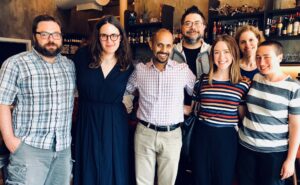The Cyberlaw Clinic is pleased to welcome back returning 2Ls and 3Ls and welcome new 1Ls and LLMs to Cambridge for the start of the 2018-19 academic year! We hope that everyone had a restful and reinvigorating summer. As we ramp up for the fall semester, we offer some announcements about the program and thoughts on the coming year.
F irst, on a bittersweet note, we bid farewell to our dear friend and colleague Vivek Krishnamurthy. Vivek is returning to private practice at the law firm, Foley Hoag LLP, after four years working with us in the Clinic. Vivek joined us from Foley back in 2014, and his practice and teaching activities in the Clinic have focused on international human rights and civil liberties issues. Vivek will be sorely missed, but we are happy to report that he will remain involved at Harvard Law School and the Berkman Klein Center—co-teaching the Counseling and Legal Strategy in the Digital Age seminar at HLS this fall with Chris Bavitz. Vivek also joins our our illustrious roster of Clinic Advisors, with whom we regularly collaborate. We wish Vivek success in his new endeavors and expect that we will continue to work closely together in the months and years to come.
irst, on a bittersweet note, we bid farewell to our dear friend and colleague Vivek Krishnamurthy. Vivek is returning to private practice at the law firm, Foley Hoag LLP, after four years working with us in the Clinic. Vivek joined us from Foley back in 2014, and his practice and teaching activities in the Clinic have focused on international human rights and civil liberties issues. Vivek will be sorely missed, but we are happy to report that he will remain involved at Harvard Law School and the Berkman Klein Center—co-teaching the Counseling and Legal Strategy in the Digital Age seminar at HLS this fall with Chris Bavitz. Vivek also joins our our illustrious roster of Clinic Advisors, with whom we regularly collaborate. We wish Vivek success in his new endeavors and expect that we will continue to work closely together in the months and years to come.
We are delighted to report that Jessica Fjeld has been promoted to Assistant Director of the Cyberlaw Clinic and will assume a central role in managing our program. Jess has done tremendous work over the past two years in the Clinic, helping to lead our copyright practice and working with students to advise a wide range of individuals and startups with an emphasis on clients in media, arts, and the creative industries. Jess joins the board of the Global Network Initiative and is also a Clinical Instructor and Lecturer on Law at HLS. She will be co-teaching the Cyberlaw Clinic Seminar this fall and spring.
The Clinic is also thrilled to announce that Mason Kortz, who has been with us for almost two years as a Clinical Fellow, has assumed the role of Clinical Instructor. Mason has deep expertise with civil liberties and privacy issues, and he brings his strong technical background in data science to bear on many of our projects. He is also a key member of the Berkman Klein Center’s research team, contributing to the Center’s Ethics and Governance of Artificial Intelligence initiative and producing valuable scholarship on the role of explanation in law and AI.
Kendra Albert begins their second year with us as a Clinical Fellow, managing projects that related to computer security research, vulnerability disclosure, circumvention, and a host of related issues. Kendra was instrumental this past year in overseeing the Clinic’s involvement in the Copyright Office’s Section 1201 triennial rulemaking proceedings, leading a student team that represented the Software Preservation Network in filing comments and testifying before the Library of Congress about the need for exemptions from liability to promote archival activities. Kendra has also been the Clinic’s point person in managing work relating to voting technology and election security in the runup to the November 2018 midterms. In the spring, Kendra will be co-teaching Advanced Constitutional Law: New Issues in Speech, Press, and Religion with Professor Martha Minow.
Project Coordinator Hannah Hilligoss will continue to keep the Clinic’s trains running on time while contributing to BKC research efforts on topics ranging from telecommunications policy to the human rights implications of AI technologies. Hannah has also played a major role in the launch of Harvard’s new “Techtopia” initiative, which promises to connect faculty and students across Harvard with an interest in the ethical, social, political, and legal implications of emerging digital technology.
Susan Crawford and Chris Bavitz round out the Clinic team, managing student projects and teaching courses about law and regulation as they relate to communications, music and digital media, autonomous vehicles, and the Internet.
We kept projects afloat this summer with an all-star cast of law school interns, and we expect more than thirty students to join us for the fall term (including three advanced clinical students, returning after working with us this past spring). The Clinic’s substantive docket will cover our usual wide variety of projects, with a few practice areas being especially active. Those include:
- answering questions about bias in the use of algorithms and machine learning technologies by companies and government actors;
- addressing legal issues raised by existing and future art-generating AI technologies, as we consider the interaction between algorithmic tech, the human creative process, and our system of intellectual property laws;
- supporting efforts to promote government transparency and accountability through targeted use of freedom of information laws and broader open government initiatives; and
- advising digital archives on questions surrounding online access to materials, particularly around IP issues that arise in connection with cross-border operations.
We could not be more excited to welcome our incoming students next week. Best wishes to all for a fruitful 2018-19 academic year!
